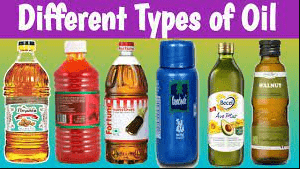Types of Oils


Oil is known as the fatty and liquid substance obtained from the treatment of certain fruits and seeds such as almonds and coconuts. It is also obtained from certain animals such as the seal and the whale, and from the pressing of olives.
During the production of oils, glycerin is used to esterify them, where depending on the type of fatty acid it contains, it will depend on how the oil will be if less or more drying.
Of all the types of oils, the most common are those used for cooking, of which olive oil stands out, as it offers many benefits to the person’s health.
Oils are not soluble in water, so they can never be mixed unless other ingredients are added.
Read Also: Fats Vs Oils
How Many Types of Oils are there?
Depending on their origin, oils can be classified as:
Animal fats
It refers to the type of oil that is obtained from the adipose deposits of certain animals, such as the case of the pig from which lard is obtained, butter is also obtained, and certain marine oils are obtained, such as the one containing omega 3.
Vegetable fats
It is the oil that in order to obtain, certain procedures are used to extract the juice from certain seeds and fruits, and prepare it to obtain the oil, as is the case with coconut butter, palm butter, and cocoa butter.
Depending on the characteristics of the oil, you can find two types of oils, these are:
Virgin Oils
It is made with the cold pressing of certain fruits and seeds, where they are exposed to a temperature of 27 degrees Celsius; In turn, it can go through a centrifugation process using about 3,200 revolutions per minute, and then it proceeds with filtration.
A perfect example of this type of oil is olive oil, which is marketed without going through a chemical refining process. This is shown as the pure juice of the olives which are treated through mechanical means. This type of oil is much more acidic and pure.
Refined Oils
They are the oils that are obtained through certain chemical processes and are then deodorized. This type of oil is always clean and with a basic color, and its conservation is perfect.
Depending on the amount of iodine that the oil contains, it will be less or more drying, three types of oils can be found, these are
Drying Oils
These types of oils have a large number of fatty acids that are not saturated, which have a very bright and resistant film when polymerized through oxygen in the air. These have an amount of iodine that amounts to 140. Example: dehydrated Castor oil, Wood oil, Linseed oil, Safflower oil, etc.
semi-drying oils
These oils have an amount of iodine between 110 and 140, of which Rapeseed oil and refined Soybean oil are found.
Non-drying oils.
These oils keep the amount of iodine below 110. Of these, pure Castor oil and Orujo oil stand out.
Other types of oils
petroleum oils
Indicates the oils obtained from petroleum, these oils are used to lubricate and operate certain machinery and mechanical equipment. These are very polluting, so when using them, the person must have good protection.
Corn, sunflower, and soybean oils
It refers to the oil that is consumed raw due to its poor resistance to heat. It has a large number of polyunsaturated fats. This does not have cholesterol like the other types of vegetable oils, however, if they are brought to heat, these characteristics lose it, becoming saturated, giving rise to an increase in cholesterol.
Cottonseed oil
It is the oil obtained from the seeds of the plant that bears its name. This is characterized by its dark color, its flavor, and its smell; which loses a little of its purity at the time of being refined. It has a high content of linoleic acid and palmitic acid. This is used to make margarine.
Peanut oil
This type of oil is obtained from the Arachis Hypogea plant. It has a different composition in terms of fatty acids, which is influenced by its origin. It has a high content of linoleic oil and oleic acid. It is very expensive, which is why it is not constantly used in the kitchen.
Safflower oil
It is very expensive and contains 80 percent linoleic acid.
Palm oil
This is obtained from the seed and fruit of the palm tree. It contains more than 50 percent of saturated fatty acids, so its consumption must be careful since it can increase cholesterol.
Olive oil
This oil is one of the most consumed, it is obtained from olives or matured olives. It contains a large amount of monounsaturated fatty acids. Of these, several types stand out, such as:
- virgin olive oils
- Olive oil.
- Refined olive oil.
- Crude olive pomace oil.
- Refined olive pomace oil.
Mixed Oil
This is the type of oil that is obtained by mixing refined olive oil and virgin olive oil. This type of oil has a large number of polyunsaturated acids which are perfect when cooking since they are not consumed by heat.
Related Post
Recent Posts
Is energy quantized in classical physics?
No, according to classical wave theory the emission of electromagnetic radiations from the surface is…
Types of laser
Basically, there are four types of laser which includes: Gas Lasers Solid State lasers Liquid…
Ultrasound frequency range
What is ultrasonics? The study and application of mechanical vibrations with frequencies beyond the limits…
Electromagnetic Energy: What are some examples of it?
Electromagnetic energy definition Electromagnetic energy is the amount of energy stored in a region of…
Fundamental units and Derived Units with Examples
The Main Difference between fundamental Units and Base units is that Units that Express base…
Newton’s First law of Motion Examples in Our Daily Life
Newton's first law of motion states that " A body continues its state of rest…